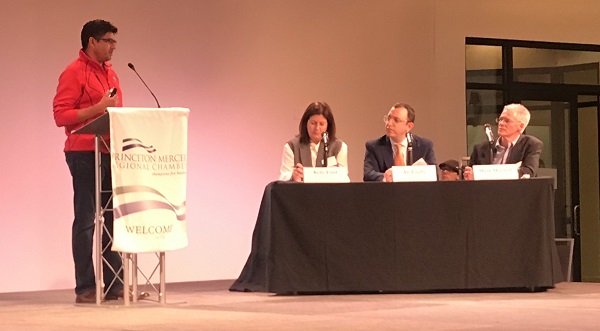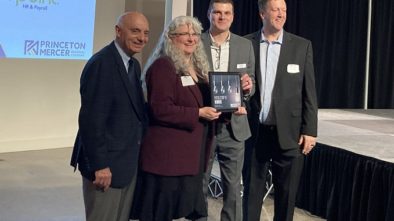Want Investors to Write You a Check? Then Follow This Advice, Panel Says.
When you’re making your pitch, know your product, but don’t focus on it in great detail. The people with checkbooks are buying your business, not your product.
You should also know your financials, have an exit strategy and be brief.
Those were just a few of the entrepreneurial words of wisdom that members of the Princeton Mercer Regional Chamber heard during a chamber event last month aptly titled “How to Convince People to Invest in You.”
The event, organized by the Chamber’s Innovation & Entrepreneurship Council, drew 250 people, who heard about the anatomy of the ideal pitch and important points that potential investors want to hear.
Ari Fuchs, managing director of The DAK Group (Rochelle Park), and one of the investors invited to speak, noted, “Investors buy businesses, not products. I also think it is critical to focus on your exit strategy even before you begin to build a business. It will sharpen your focus. Understanding the competitive landscape also is critical.
“Investors’ attention is captured by stories, and not features. Facts tell. Stories sell. Focus on the emotional aspects of your product or service. Focus on the benefits your product or service brings to its customers — that will drive investor interest.”
That was the kind of optimistic news that pleased Akshay Kamath, cofounder and CEO of Nutrivide (New Brunswick), and his team; and Ranjeet Vidwans, a cofounder of Clearedin (Los Altos, Calif.) who lives in Cranford.
Kamath and Vidwans both told NJTechWeekly.com that this event offered them an opportunity to talk up their businesses to the investor panel, which, in addition to Fuchs, included Mark Mitchell, managing director at Delaware Crossing Investor Group (Princeton); and Kelly Ford Buckley, a tech industry executive turned growth equity investor and general partner at Edison Partners (Princeton).

Clearedin helps customers prevent “spear phishing” and account-takeover attacks by using an artificial intelligence (AI)-powered cloud communications security platform. Having already started getting traction in the marketplace, the company is not currently seeking funding from investors, but it will be in the future, and Vidwans was in the right place to network.
“I wish events like these existed when I first started pitching startups many years ago,” Vidwans told us. “In spite of having gone through the process many times, it’s always great to hear unvarnished feedback from check writers about what they would like to see in a pitch. For us, the event was beneficial in multiple ways: It’s an opportunity to contribute back to the entrepreneurial community here in New Jersey, and it helps to sharpen our pitch when we’re ready to kick off our next fundraising cycle.”
Vidwans said that Clearedin expects to start its next round in the second half of this year.
Nutrivide, meanwhile, is working on its flagship product, the Nutrifier, a pacifier modified to store and dispense micronutrients to boost healthy infant growth.
Kamath and his team are hoping to raise $400,000, and were grateful for the platform. “The organizers had done a fantastic job of keeping the event on schedule and providing the audience with key takeaways from voices of real investors. We met a lot of great people, and look forward to learning further from future events held by the Chamber,” Kamath said.
“An infant’s first 1,000 days are crucial. In these three years, an infant will reach countless milestones, from learning to walk, to speaking a first word,” he told the panel of investors.
“But 150 million infants around the world suffer from malnutrition, leading to the loss of 3 million lives every year. A number of these cases occur because mothers are unable to healthily breastfeed their babies and, accordingly, do not deliver all of the essential nutrients.”
The Nutrifier would change that narrative, using a baby’s natural sucking reflex to deliver vitamins and minerals, the team said.
When the Nutrivide team concluded their pitch, the panelists had their say. “Ultimately, we do not invest in products. We invest in businesses. So, at the initial phase, you have to sell us on the business,” said Mitchell.
“I know roughly how your product works. The technical details of it, we can cover that later. My approach going in is that your product works.” he said.
“But how do you make a business out of it? Because no matter how good that product is, if you don’t have your sales force, or price it correctly, or can’t build a revenue model, advertise it, or stop competitors from stealing it — all these other things that you have to have in order to have a business — that is what initially I need to get comfortable with. You’ve got to sell me on your business.”
Buckley echoed his views. “The best pitches that show you have a business will articulate early in the presentation how you make money. And it is intersected with your value proposition, so the levers for your growth are directly connected to the value that you deliver to your customer,” she said, adding that the team should rely “less on the product details.”
And then there’s the exit strategy. “How important is the exit strategy in the pitch? For me? Very,” she said, noting most exits occur within four to seven years.
Mitchell agreed, saying, “If we can’t see how we get our money back, then we not going to move forward.”




